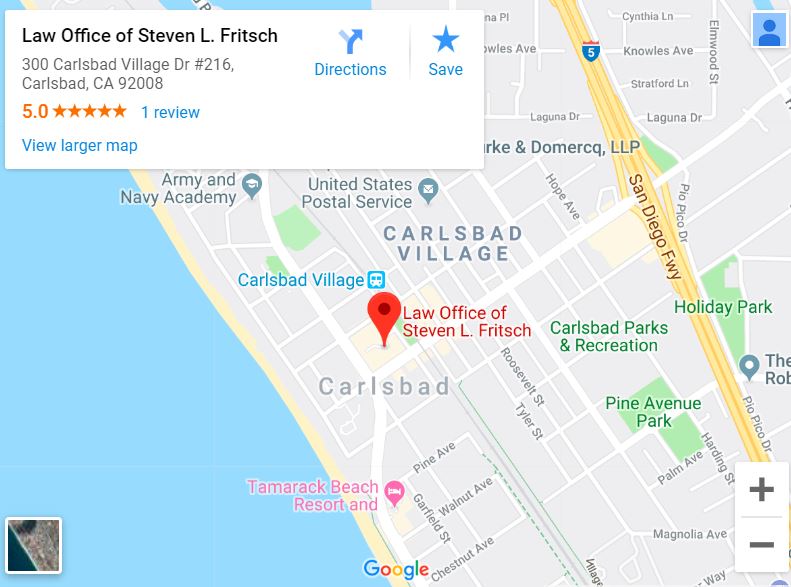
Dividing Community Property
California is a community property state which means there is a presumption that any asset or debt acquired during marriage until the date of separation is that of the community or community property. However, if assets or debts have been acquired prior to marriage, acquired after the date of separation, acquired by gift or inheritance, or transmuted or transferred during marriage from community to separate property it may be considered the spouse’s separate property. Therefore, when dividing marital property, one of the first issues that must be determined is whether an asset or debt is community or separate property.
To determine this we look at when the asset or debt was acquired or transferred. This is called “time of acquisition” and plays significant role in determining the character of the property. Also, if a spouse obtained an advantage by the transfer from community to separate property or separate to community property, it may have an impact of the character of the property. Some property may have both a separate property and a community property interest and therefore a determination of both interests is needed.
Value of Assets and Property
The valuation of assets must occur before an asset is divided. Unless the parties can agree as to the value the court may look to experts or other sources to determine the value of an asset. Some valuation of assets is more difficult than others such as business, real estate, stock options or pensions. These assets may need experts such as accountants, realtors, appraisers and actuaries to determine their value.
What Happens If A Spouse Is Hiding an Asset?
California requires full disclosure in a divorce proceeding. That means that each spouse must provide the other spouse with information regarding all the assets and debts. In most cases, the spouses are forthcoming and do not try to hide assets. Unfortunately, this full disclosure does not always happen and spouses may try to hide assets. The question then is how does a spouse find the hidden assets?
Schedule of Assets and Debts
First, it is important if you are contemplating divorce or know that there will be a filing for divorce, to investigate and search for documentation and copy any information about assets. If you cannot copy it than make sure you write down the information because any little bit helps. Even if it is simply knowing the name of an investment account or bank account, that information can go a long way.
As stated previously, each party must disclose all their assets and debts. This is done by completing and exchanging a Schedule of Assets and Debts. It must be done on this document. Most of the time, the spouses give accurate information. But what happens if they don’t? The process of seeking information during litigation is called “discovery”. Discovery is accomplished in many ways. A party can request that the other party produce documents or answer questions that have been submitted to them on paper. Obviously, if they are hiding assets they may produce little or no documents. If they don’t the court can sanction them or sometimes preclude that party from making arguments about that asset or debt at trial.
Deposition
Another way to seek information is through a deposition. This is where the party is asked questions under oath and his or her answers are recorded by a court reporter. This can be a very effective tool because the party is sitting down in a room and responding to questions which are under oath. Face-to-face questioning can be better than sending questions but is also more costly. A subpoena is another great way to get information. This is done when the attorney issues a subpoena to a third party and that party is ordered to produce documents. For example, a subpoena can be issued to a bank and that bank may have to produce copies of bank statements, checks, wire transfers, etc. This is why it is important to pay attention to documents in the house when divorce is contemplated. All you need to know is the name of the bank or investment and through a subpoena you can get a lot of valuable information.
What will the court do if an asset is not disclosed but later discovered? What the court does will likely be determined on whether the failure to disclose was an accident or intentional. If it was an accident, the court will probably do nothing. If the failure to disclose was intentional and done with oppression, fraud or malice the court can come down hard. It could issue a monetary sanction or in some cases it could award the entire non-disclosed asset to the other spouse.
In sum, it is not the end of the world if you believe the other spouse is hiding assets. Although it will take more time and may be costly, there are excellent tools to obtain information. And if a hidden asset is discovered the court can make life very difficult for the spouse that was being deceptive. Therefore, it is always smart to fully disclose your assets because most times, that asset is discovered and if it is you divorce can go south very quickly.
Steven L. Fritsch, Esq. has much experience regarding the division of assets and debts. He has the knowledge and understanding of the laws associated with dividing property and what is needed to obtain an equitable division. Not only has he negotiated numerous property settlements but he also has the litigation experience to present and argue your property issues in court. Please contact The Law Office of Steven L. Fritsch to discuss the valuation, characterization and division of community and separate property assets.
